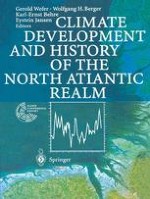2002 | OriginalPaper | Chapter
Climate Changes During the Holocene Recorded by Lakes from Europe
Authors : Sandy P. Harrison, Ge Yu, Juri Vassiljev
Published in: Climate Development and History of the North Atlantic Realm
Publisher: Springer Berlin Heidelberg
Included in: Professional Book Archive
Activate our intelligent search to find suitable subject content or patents.
Select sections of text to find matching patents with Artificial Intelligence. powered by
Select sections of text to find additional relevant content using AI-assisted search. powered by
Lake records provide an important source of information about climate changes on submillenial to millenial timescales during the Holocene. Analyses of lake records from Europe show that there are regionally-coherent patterns of change in lake status (a qualitative index of changes in water depth, area or volume) through the Holocene, reflecting climatically-induced changes in regional water budgets. Rapid changes in lake status occur in many regions of Europe between 9500–9000, 7500–7000 and 4500–4000 yr BP This apparent synchroneity in the timing of changes, although the direction varies from region to region, indicates that the changes in lake status are driven by changes in regional water balance caused by major reorganisations of the atmospheric circulation. Modelling studies indicate that changes in precipitation are the most important cause of changes in lake behaviour across Europe, because the lake water balance in temperate humid regions is largely controlled by runoff from the catchment. Changes in winter precipitation produce a much larger change in runoff and hence in lake response, than changes during the summer growing season. Sensitivity to precipitation changes is enhanced where solar radiation receipts are high: a given change in precipitation will therefore produce a larger response in the lake water balance in southern and eastern Europe than in northern or western Europe. The sensitivity of the lake water balance to changes in precipitation is dependent on the ratio of lake area to catchment area: sensitivity increases as the ratio becomes larger. The lake area to catchment area ratio at which a lake become sensitive varies with the magnitude of the precipitation change. Lake studies have the potential to contribute significantly to documenting and explaining Holocene climate changes across Europe. Continued improvements to the existing lake data base (including improvements to the lake chronologies), coupled with the application of geostatistical and modelling techniques will be required in order to exploit these archives fully.
